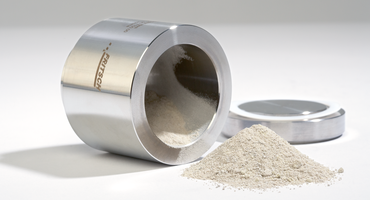Torna alla panoramica
Planetary Ball Mills as an instrument in mechanochemistry
Mechanochemistry is a sub-group of physical chemistry and addresses the effects of mechanical energy on solids and the resulting chemical modifications. Here, FRITSCH Planetary Mills have been indispensable for a long time.
History of mechanochemistry
Chemistry can be divided in many different fields. Electro-chemistry and biochemistry are to be mentioned as an example. The beginnings of mechanochemistry can be traced to the start of the 19thcentury [1]. The first studies were conducted by M. Carey Lea and focused on mechanically induced reactions of solids. Lea used a metal halide and processed it with a mortar: separating the metal and halogen. This was the beginning of numerous research activities and thus founded an additional sub field of physical chemistry [2].
The goal of mechanochemistry
In mechanochemistry, the emphasis is on the synthesis of new materials, respectively the alteration of existing material properties. Here it is attempted to break apart the known atomic structure of a material and the links of individual atoms chains or also replacing existing gaps with other material [3]. This process requires special conditions, since in these structures numerous forces are at work. With a Planetary Ball Mill the needed high impact forces, high pressures and the necessary temperature are perfectly obtained [4].
Fields of application
One specific field of the mechanochemistry is the tribochemistry, it deals with mechanical alloying. The term tribochemistry is derived from tribology, which means the study of friction. During mechanical alloying only surfaces are coated with other materials and the core structure is not altered. Due to the already mentioned forces during mechanochemistry, the particle size of the material becomes smaller and the specific surface enlarged.
The resulting nano particles feature other physical and chemical properties than the macroscopic ones. Therefor is the production and researching of nano scale materials another important field of mechanochemistry. In the pharmaceutical field, mechanochemistry is utilized to convert active substances into polymorphous forms. This is often problematic, since the naturally available polytypes are biologically ineffective. The hydrogen energy technology was fortified with new storage possibilities. With the mechanochemical modification of the storage cells, the capacity and absorption kinetic can be increased. An additional interesting application is the solvent-free synthesis of materials in Planetary Ball Mills.
Are you interested in the diverse branches of mechanochemistry?
Read numerous articles on the specific subjects of mechanochemistry - please keep in mind that in some cases the information may only be available in German.
-
Download the FRITSCH-report as a PDF file
-
Additional reports about mechanochemistry
Organisch-Chemische Synthesen in der Kugelmühle PULVERISETTE 7 classic line
Speed-up your synthesis lab: Planetary Ball Mills as a tool in organic synthesis
-
A film about the topic
-
Sources and continuative literature
Solvent-free Syntheses in the Ball Mill
[1] Chemie 10. Aufl., C. Mortimer und U Müller, Thieme Verlag
[2] Chemie der Werkstoffe 2. Aufl., H. Briehl, Vieweg+Teubner Verlag
[3] Werkstoffkunde 17. Aufl., W. Weißbach, Vieweg Verlag
[4] Verfahrenstechnik, Mechanische Verfahrenstechnik 3. Aufl., W. Fratzscher, G. Gruhn, K.Militzer und H. Schubert,Spektrum Akademischer Verlag
[5] Šepelák, V., Menzel, M., Bergmann, I., Wiebcke, M., Krumeich, F., Becker, K.D., J. Magn. Magn. Mater. 2004, 272-276, 1616.
Torna alla panoramica













